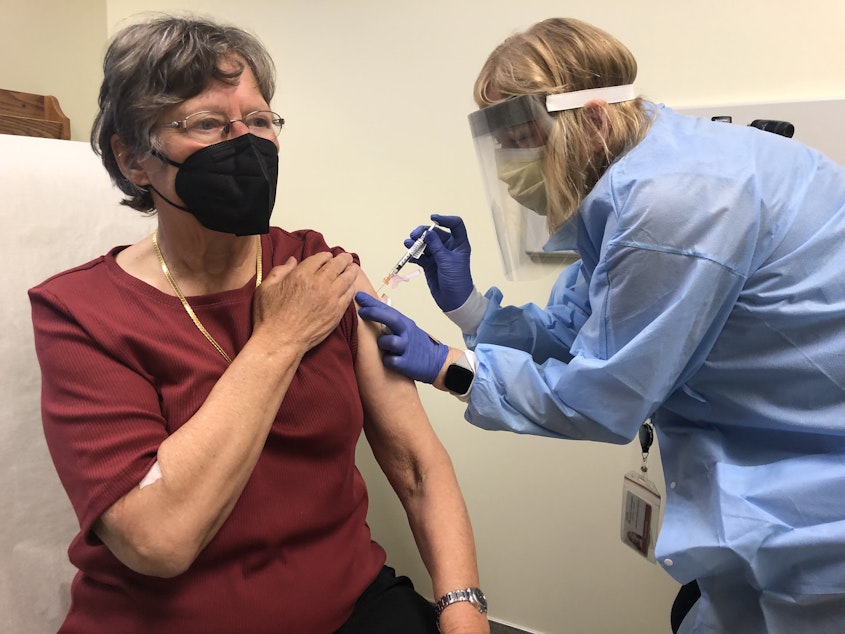Why older people and the immuno-compromised could need yet another Covid shot

It's been just over four years since the first case of 2019 Novel Coronavirus was reported in the U.S., not far from Seattle at the Life Care Center of Kirkland nursing home. We’re transitioning from pandemic to endemic. The U.S. ended its public emergency phase last May, but Covid is still with us. This week, the Centers for Disease Control recommended that people aged 65 and up get another Covid booster this spring.
For an update on where we are now, KUOW’s Kim Malcolm reached out to Dr. Amanda Casto. She's an acting assistant professor of allergy and infectious diseases at the University of Washington.
This interview has been edited for clarity.
Kim Malcolm: What do you make of the CDC recommendation on boosters this spring?
Dr. Casto: I think it's important for people who are 65 and older, or who are immunocompromised, to get a second dose. In the fall, we introduced the vaccine that's targeted towards Omicron. This offers some additional protection for the variants that are circulating right now.
I'm curious why people who have already been vaccinated or have had Covid before are still getting it.
Previous infection and vaccination are never perfect. The virus is always changing. Sometimes it makes larger jumps than others. So it takes our immune system a period of time to recognize it. And sometimes that time is enough for the virus to replicate and take hold.
Sponsored
How concerned are you that a variant could somehow rear up and throw us backward into a pandemic?
Well, I think it's always a possibility. I think it's very hard to predict exactly what the virus is going to do. I think the advantage that we have now is that most people are vaccinated or have had an infection prior, or both. And those antibodies will provide some protection against the virus compared to when we were first encountering it back in 2020.
With this virus, I don't think we will ever go back to where we were in 2020. We could definitely have some upticks in frequency with a virus that's different, and so less well-recognized by those antibodies, but I think it's unlikely that we would go all the way back.
You research this disease. You work in a hospital clinic. What do you tell your family and friends about where we are now, at this stage with Covid?
The genomics of the virus is always going to change somewhat. But it's probably going to get to a point where we kind of settle into a more seasonal pattern, like we see with flu and other respiratory viruses. We will probably usually see Covid go up in the winter, and then come down in the summer months. And it will become much more predictable in that way.
Sponsored
But even as we have with flu, there are certain years that new variants emerge, and we have particularly large outbreaks or particularly large groups of people becoming ill. That's certainly possible with Covid, but I think it will become more predictable over time. It's going to become much more like our other respiratory viruses.
I tell different people different things. I have parents who are in their 70s. I encourage them to get vaccinated and to keep up with the vaccine recommendations. That's first and foremost. And then I also just encourage them, if they think they've been exposed, or if they're not feeling well, to get tested. And I have two nieces who are under 10. In a lot of ways, it’s very similar. I still think the most important thing is to keep up with the vaccination recommendations.
All of us, it’s just a human inclination to want to forget about the bad times and just charge into the future, feel free, and not have to think about wearing a mask, or what have you. But some of us just don't have that freedom to do it.
And I think it's very important that people balance out the risk of Covid with other things. I think a good example is my parents like to go to the Y so they can be active. My mom was initially concerned about whether that was a good idea. But I think her being active, and getting exercise, is an important thing as well, and so are social interactions. So, I think people should be careful, but I don't think they should be so fearful that they really kind of limit their lives.
Listen to the interview by clicking the play button above.





